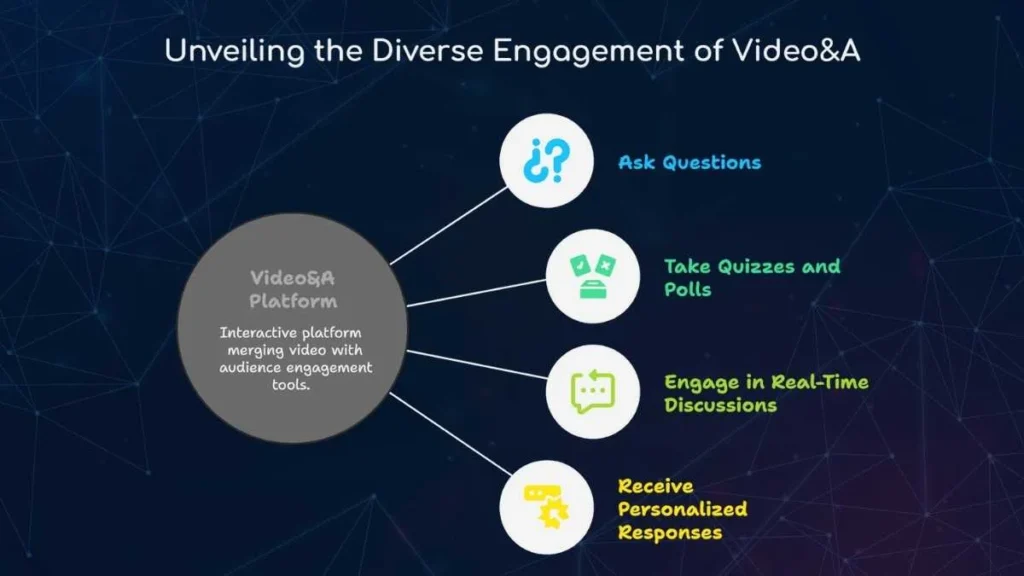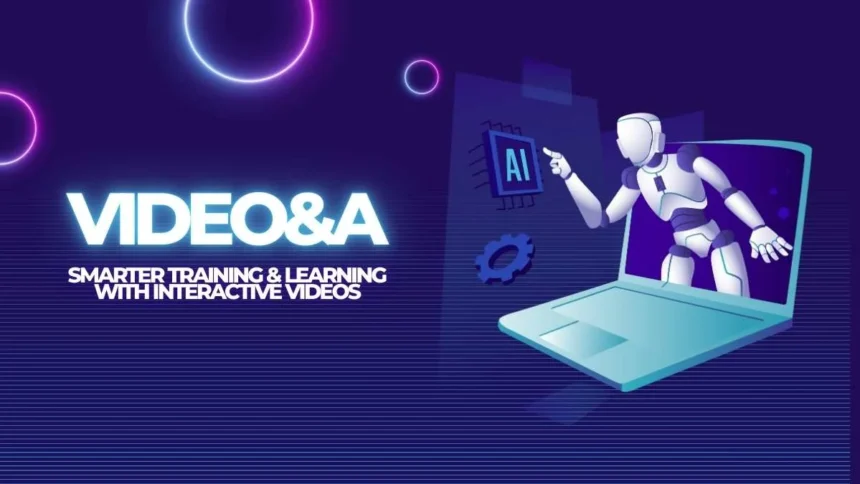Video&A is an interactive video platform that combines video content with built-in Q&A, quizzes, and discussion tools. It allows viewers to ask questions, participate in polls, and engage in real-time conversations while watching. This turns traditional video into a dynamic, two-way learning experience.
So, what is Video&A exactly? In simple terms, it’s a modern tool that transforms passive viewing into active engagement, making education, corporate training, webinars, and customer interactions more effective. With its integrated features, Video&A creates a personalized journey that is both informative and interactive.
What is Video&A?
iT is an interactive video platform designed to merge traditional video content with audience engagement tools. Instead of merely watching, viewers can:
- Ask questions while watching the video.
- Take quizzes and polls to test understanding.
- Engage in real-time discussions with presenters or peers.
- Receive personalized responses that foster deeper connections.
This approach transforms the viewing experience from passive consumption to active participation. Whether it’s a student watching an online lecture, an employee attending corporate training, or a professional joining a webinar, IT ensures that every participant is not just watching but actively learning and interacting.

Understanding the Shift in Video Engagement
Traditional video formats often leave viewers as passive consumers. They watch, but rarely interact. Over time, this can lead to a reduction in attention span, limit learning, and lower retention.
Interactive video tools like Video&A solve this by embedding participation elements into the experience. Instead of being just a lecture, webinar, or product demo, each session becomes a dialogue between creator and audience.
Key Features of Video&A
It stands out because of its integrated and user-centric functionalities:
1. Built-In Q&A
Viewers can ask questions directly within the video interface. This allows presenters to respond in real-time or address queries later, ensuring no doubts go unresolved.
2. Interactive Quizzes and Polls
Quizzes, polls, and checkpoints can be embedded within the video. This not only enhances engagement but also evaluates comprehension, making it ideal for educational and corporate settings.
3. Real-Time Discussions
Unlike static video platforms, Video&A integrates chat and discussion boards. Participants can engage with peers and instructors without leaving the video environment.
4. Analytics and Feedback
Content creators and educators can track engagement metrics, quiz results, and audience interactions. This data helps refine future sessions and tailor content to specific audience needs.
5. Personalized Learning Experience
By integrating adaptive features, it ensures that each viewer can interact with the content based on their unique needs, making the platform highly versatile.
Where Video&A Is Making an Impact
Education and Online Learning
Students today expect more than static lectures. With quizzes, live chats, and the ability to ask questions mid-lesson, learning becomes collaborative and engaging. Teachers also gain valuable insight into class progress.
Corporate Training
Companies use Video&A to create training modules that aren’t just informative but also interactive and adaptive. Employees retain knowledge better and can clarify doubts instantly.
Webinars and Events
Instead of passive audiences, webinars become participatory events where attendees answer polls, submit questions, and share insights.
Customer Engagement
Brands integrate interactive videos into their marketing and support systems. Customers can ask questions in real-time, making brand communication transparent and trustworthy.
Benefits That Set Video&A Apart
Its approach brings measurable advantages:
- Higher engagement rates through interactivity.
- Improved knowledge retention due to active participation.
- Stronger communication bridges with real-time Q&A.
- Valuable analytics-driven insights for creators.
- A more personalized experience for every user.
Table: Comparing Traditional vs Interactive Video
| Aspect | Traditional Video | Video&A Interactive Platform |
| Viewer Role | Passive watcher | Active participant |
| Q&A Integration | Separate session/tools | Built directly in video |
| Retention Rate | Lower | Higher |
| Real-Time Interaction | Limited or absent | Always available |
| Analytics | Basic views | Detailed engagement data |
| Personalization | Minimal | Strong, user-driven |
The Technology Behind Video&A
Video&A integrates AI-driven analytics, cloud-based video hosting, and real-time interaction tools to deliver seamless user experiences. AI enables automated response suggestions, predictive insights, and adaptive learning pathways, while cloud infrastructure ensures scalability for large audiences without disruptions
Why Video&A Matters in Today’s Digital Era
In an age where attention spans are shrinking, it addresses a critical gap: the need for interactive, engaging, and effective communication tools.
- For educators, it fosters better learning outcomes.
- For businesses, it enhances employee development and customer satisfaction.
- For professionals, it ensures active participation in training and webinars.

By merging content delivery with interaction, Video&A represents the future of video communication.
FAQs
Q1: Can Video&A be integrated with existing LMS systems?
Yes, it can be embedded or linked to most modern learning management systems.
Q2: Does Video&A support multilingual interaction?
Absolutely, it allows multi-language support for global learners and teams.
Q3: Is Video&A suitable for small businesses?
Yes, it is scalable and can be tailored for both startups and large enterprises.
Conclusion
Video&A is more than a video tool; it’s a new way to learn, train, and engage. By combining content with interactivity, it breaks away from the limitations of one-way communication and creates a more personalized, effective, and lasting impact.
As technology advances, interactive platforms like Video&A will play a central role in shaping the future of education, corporate development, and digital communication. The shift is clear: the future of video is about participation, not just viewing.






